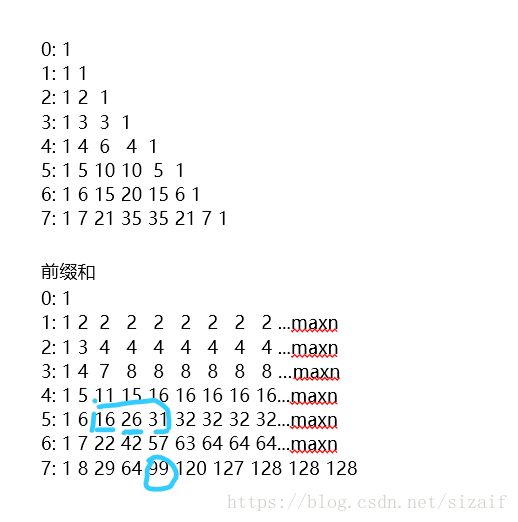@HDU 6333 @HDU多校第四场:Problem B. Harvest of Apples (分块思想)
Time Limit: 4000/2000 MS (Java/Others) Memory Limit: 262144/262144 K (Java/Others)
Total Submission(s): 2944 Accepted Submission(s): 1143
Problem Description
There are n apples on a tree, numbered from 1 to n.
Count the number of ways to pick at most m apples.
Input
The first line of the input contains an integer T (1≤T≤105) denoting the number of test cases.
Each test case consists of one line with two integers n,m (1≤m≤n≤105).
Output
For each test case, print an integer representing the number of ways modulo 109+7.
Sample Input
2 5 2 1000 500
Sample Output
16 924129523
[思路]
如果 直接求的话必然会超时.
所以这里用到了分块的思想
有 杨辉三角 和其前缀和
根据杨辉三角性质 C(n,m) = C(n-1,m) + C(n-1,m-1) 前缀和也有这个性质
那么Sum(7,4) = 42+57 = 16+26+26+31
如果 我们以每5个为一组的话, 你会发现 Sum(7,4) 恰好 等于 C(2,0)*16 + C(2,1)*26 + C(2,2) * 31 = 99
7 和 5 差了 ,2 , 第7 项 可以有 第5 项推出来
这样的话, 我们推到1e+5 , 1e5 分块的话 一块 333 差不多, 然后 我们只需要 处理 333,2*333,3*333,4*333.....
当 n <333 直接暴力就可以
当 n > 333 采用分块 找到最近的 那一块, 然后推出答案.
详细请看代码
[代码]
#include
#include
#define rep(i,a,n) for(int i = a ; i<=n;i++)
#define per(i,a,n) for(int i = n;i>=a;i--)
#define Si(x) scanf("%d",&x)
typedef long long ll;
const int maxn =1e5+10;
const int mod =1e9+7;
using namespace std;
const int fk=332;
ll fac[maxn+5];
ll inv[maxn+5];
ll sum[350][maxn];
int n,m;
inline ll qpow(ll a,ll n)
{
ll res = 1; for(;n;n>>=1){if(n&1)res =(res*a)%mod;a=a*a%mod;} return res;
}
void init()
{
fac[0]=1;
rep(i,1,maxn)
fac[i] = (fac[i-1]*i)%mod;
inv[maxn] = qpow(fac[maxn],mod-2);
per(i,0,maxn-1)
inv[i] =(inv[i+1]*(i+1))%mod;
}
ll C(ll n,ll m)
{
if( m > n) return 0;
if( m==n || m==0) return 1;
return fac[n]*inv[n-m]%mod*inv[m]%mod;
}
void block()
{
for(int i = fk; i< maxn; i+=fk)
{
ll res = 0;
for(int j = 0 ; j =0 ;i--)
{
ans = (ans + C(p,cnt)*sum[d][i]) %mod;
cnt --;
if(cnt<0)
break;
}
}
printf("%lld\n",ans%mod);
}
return 0;
}

